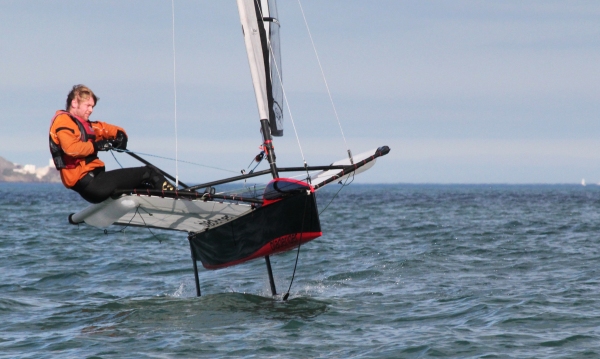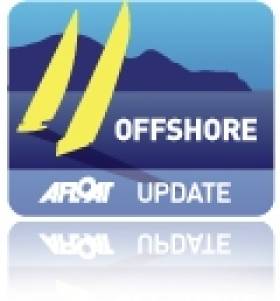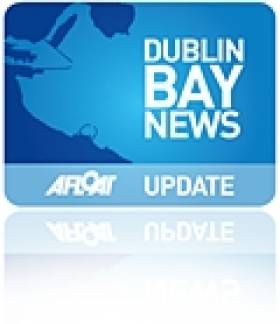Displaying items by tag: speed
#roundirelandspeeedsailing record – It's been a tricky second night at sea for Musandam-Oman Sail's in its Round Ireland speed sailing record bid. At 0600 the six-man international team is speeding past Dungarvan on the south coast at over 24 knots. It's an impressive speed but there is still approximately 120–nautical miles to sail to the Dublin Bay finish line. Force six winds are blowing from a favourable westerly direction and forecast to get stronger this morning and there is a flood tide until lunchtime, but several hours spent in little wind off the Mayo coast yesterday afternoon may yet prove costly.
This time yesterday, the crew were surfing across the top of Donegal. Only 12 hours ago, the team was halfway down the west coast of Ireland in a low pressure and 'on track for a mid–morning finish' this morning. Reports from onboard last night said 'It is likely to be a challenging night'. Since then they have sailed 170–nautical miles to the Fastnet Rock, hitting speeds of 27 knots off the Kerry coast. They came close inshore at Cape Clear at midnight before heading offshore again in an attempt to make faster progress along the Munster coast. Since midnight the crew have been focussing on the final 200 nautical miles to the finish.
To beat the 22–year record set by Steve Fosset's Lakota in 1993, the Oman Sail Mod 70 Multihull needs to cross the line before 1400 hours this afternoon. At 0800, with the final 100nm to go, the team, who had originally signalled an ETA at 'mid–morning' have revised this to be 'middle of the day'. It is an indication perhaps, if the Fosset record is broken, it will not be by much even if speeds do increase up the Wexford and Wicklow coasts this morning.
Moth Dinghy Debuts on Dublin Bay
Since our report on Ireland's debut at the Moth worlds in January it was inevitable that one of these high speed sailing dinghies would appear on Irish waters soon enough. Yesterday, John Chambers took his first tack of 2011 on Dublin Bay in a Moth he bought in France. Clearly the high speed foiling craft did not go unnoticed. It got an immediate thumbs up from the nearby DMYC frostbite fleet sailing their penultimate race.
The Bladerider Moth came blasting back from the Baily lighthouse, according to eyewitness accounts. It has hydrofoils on the dagger board and rudder which lift the boat out of the water when sufficient speed is achieved.
It is Chamber's intention to sail the innovative dinghy in this Summer's Dublin Bay Sailing Club (DBSC) summer season.
Video of the Dublin Bay sail plus a photo from Bob Hobby is below:

Moth sailing on Dublin bay. Photo: Bob Hobby
Moth sailing in Ireland on facebook HERE






























































